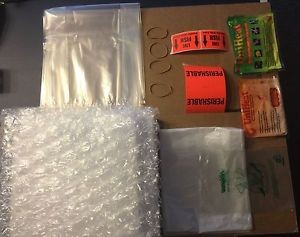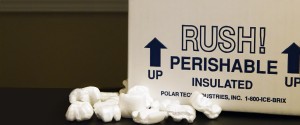 One of my goals when writing about the aquarium hobby, is to help people become educated consumers. The world of retail (retail on anything, not just aquarium livestock) is often designed to encourage people to make fast decisions, build-up excitement and enact a knee-jerk buyer reaction. Reef aquariums often don’t react well to knee jerk reactions, impulse purchases or quickly made decisions. When setting out to get new livestock, it’s best to be methodical, smart and skeptical. It’s also important to understand the guarantee policy the livestock you buy is covered under. Most LFS style shops don’t offer a guarantee, since the aquarist is able to visually assess the livestock, before making a purchase. Also, getting the livestock from the shop, to their aquarium, is the aquarist’s job in LFS sales scenarios. When ordering online, aquarists don’t get a chance to visually inspect the livestock their buying, other than a picture, which may or may not represent the coral they are buying. They also aren’t directly in control of getting the livestock from the outlet, to their aquarium. Since this type of purchase is unconventional from an aquarium livestock viewpoint, the animals are often covered by a guarantee policy, and sometimes this is the only assurance the aquarist has that the animals they are getting will be alive, and resemble what they were shown on a website.
One of my goals when writing about the aquarium hobby, is to help people become educated consumers. The world of retail (retail on anything, not just aquarium livestock) is often designed to encourage people to make fast decisions, build-up excitement and enact a knee-jerk buyer reaction. Reef aquariums often don’t react well to knee jerk reactions, impulse purchases or quickly made decisions. When setting out to get new livestock, it’s best to be methodical, smart and skeptical. It’s also important to understand the guarantee policy the livestock you buy is covered under. Most LFS style shops don’t offer a guarantee, since the aquarist is able to visually assess the livestock, before making a purchase. Also, getting the livestock from the shop, to their aquarium, is the aquarist’s job in LFS sales scenarios. When ordering online, aquarists don’t get a chance to visually inspect the livestock their buying, other than a picture, which may or may not represent the coral they are buying. They also aren’t directly in control of getting the livestock from the outlet, to their aquarium. Since this type of purchase is unconventional from an aquarium livestock viewpoint, the animals are often covered by a guarantee policy, and sometimes this is the only assurance the aquarist has that the animals they are getting will be alive, and resemble what they were shown on a website.
When I worked in real estate sales, I was surprised that far more training existed to teach agents how to persuade buyers to make a purchase, rather than assess all the variables tied in with their families’ financial future and prospective home. Some vendors may be more concerned with convincing an aquarist that they need a “rare” coral, then they are with making sure their customers have thriving, healthy tanks. Since we spend thousands of dollars on reef livestock, that guarantee policy needs to be steadfast. Some aquarists (myself included) order 99% of all their livestock online, and sooner or later, you will attempt to act on a guarantee policy.
In order to help educate aquarists, I will break down four model guarantee policies. I will explain what to look for, what to question and how to perceive the policies, along with a risk assumption for each one.

Policy 1: Live arrival guaranteed with stipulations. Coral not guaranteed past live arrival:
I call these types of guarantee policies coral ordering prenuptial agreements. The vendor appears to be saying, “We want to sell you the coral you love, we want to make sure it gets to you healthy, but we want to cover ourselves in the event of any issue that could take place.” In essence, if something does go wrong, we want to be sure an avenue exists to suspend a live arrival guarantee. These policies may read something like this:
Live arrival is guaranteed, but here are the stipulations:
- We don’t offer any guarantee based on the performance of Fed Ex or UPS. This means the vendor is not assuring that the delivery service will get your package to you safely. This means that if damage occurs during shipping, say the box is bent up and one of your coral’s bags has leaked, and the coral is dead, the vendor will not issue a refund of any type. In addition, if UPS or Fed Ex fails to knock on your door, or leaves your box where you cannot easily find it, and it sits outside because you weren’t notified of delivery, the vendor isn’t offering any refunds. This is broad, and can almost absolve the vendor of any livestock death due to something related with the shipping service.
- Weather plays a broad role in our guarantee policy, and it’s your responsibility to notify us of the weather and follow our suggestions. This may mean if you order corals and fail to inform the vendor that there is cold weather, snow or any unusual weather that you may have been aware of, then the guarantee policy is void. Also, if weather delays your shipment, the vendor has the right to void the guarantee policy. The vendor is putting the responsibility for weather monitoring on you, and if your shipment date needs changed, you need to make the vendor aware. Some vendors will hold livestock for a period of time, while waiting for weather to improve, while others won’t and will want to ship your corals, without applying their guarantee policy. This stipulation is broad, allowing weather to serve as a voiding factor in the guarantee policy. Considering the only weather to expect, is weather, this can get dicey for aquarists. Some weather events are common sense when shipping live animals, such as the recent East Coast blizzard, yet other times vendors are suspending guarantees for average winter weather.
- You must pick your package up at a customer service center. This may mean that waiting for a UPS or Fed Ex driver to deliver the package to your home, can result in a voided guarantee policy. The vendor is asking that you drive to the UPS or Fed Ex service center and pick up your package directly from the shipping service. Some of us are located an hour or more from UPS or Fed Ex customer service centers, so it may be difficult or impossible for us to make those arrangements. In this event, speak with the vendor and ask if the policy is voided if you wait for the UPS or Fed Ex driver to deliver it to your home. Often you have to notify Fed Ex or UPS in advance, if you’re planning on picking a package up at the service center, so that it does not get loaded onto a truck. From personal experience, this can be a headache and often UPS or Fed Ex wants the shipper (aka the vendor) to make these arrangements.
- If any livestock is dead or looks stressed, we must be notified within x amount of hours after delivery or pick-up. The vendor may be saying that if you fail to notify them of problems outside a certain time range, then they can void the guarantee policy. This means if a coral arrives and looks stressed, and you decide to wait until the following morning to see if it’s alright, there is a good chance you won’t be given a refund if the coral dies. Give ample thought to the time period given to report problems, as some vendors only allow for as short as two hours. This can be tough, if acclimating a large box of corals, judging their health and contacting a vendor before they close. Vendors often use UPS or Fed Ex reporting to judge when the package was picked up or delivered. I’ve personally noticed that this isn’t always accurate. If you had your coral delivered to your office, and waited until you got home to acclimate them, chances are if one is dead you won’t get a refund.
If ordering from a vendor with a highly stipulated guarantee policy, make sure you are clear with all the stipulations, and can meet each of the policies’ requirements. If you can’t, your only two options are to order with the risk of no refund for a DOA animal, or order from another vendor with a more forgiving policy. Discuss your concerns with the vendor, as some are willing to work on a case by case basis, while others hold steadfast to their guarantee terms. Some vendors post one set of terms, and seem to change those or create new stipulations on the fly. Keep all communications. Make sure to note who you talked to and what you were told, and it’s often best to communicate via email.
The risk of not getting a refund of any type is moderate to high, when ordering from vendors with highly stipulated guarantee policies, largely because so many stipulations are listed, they have an avenue to void a guarantee under almost any circumstance.
 Policy 2: We don’t have a set guarantee policy, but want customers to be comfortable ordering with us, and work with each and every customer’s case, in the event of problems. In addition to live arrival, we offer extended guarantee policies on the following livestock.
Policy 2: We don’t have a set guarantee policy, but want customers to be comfortable ordering with us, and work with each and every customer’s case, in the event of problems. In addition to live arrival, we offer extended guarantee policies on the following livestock.
Fish: x amount of days
Coral: x amount of days,
Inverts: x amount of days
Frags: x amount of days
These policies are usually a vendor’s attempt to give aquarists the same comfort level as buying livestock from a traditional LFS. They have acknowledged the risks associated with ordering livestock online, and also accepted that you, the customer, is making a leap of faith, ordering livestock you haven’t seen in person. Sometimes outlets with these types of guarantees don’t offer cash refunds, but do offer credit and replacements. In my experience, outlets with a policy such as this work with aquarists if something arrives dead, or even if it dies after an extended time in your tank. Some outlets offer a credit or replacement up to nearly a month after livestock has been delivered. Nothing is set in stone, and any instance or scenario is up for discussion.
Your chance of not getting a refund of any type is low, when ordering from vendors with these types of guarantee policies.
 Policy 3: We take our guarantee policy seriously, and we guarantee your order 100% risk-free.
Policy 3: We take our guarantee policy seriously, and we guarantee your order 100% risk-free.
These guarantees are often all inclusive, and extend beyond DOA livestock. Usually they offer cash refunds, replacements or store credit toward a future order. Sometimes these policies extend up to two weeks after livestock is delivered, and sometimes they extend even longer. They are a simple to understand, 100% risk-free guarantee.
You chance of not getting a refund of any type is low, when ordering from vendors with these types of guarantee policies.
 Policy 4: Once UPS or Fed Ex picks up a box from our shop, we wash our hands of all liability.
Policy 4: Once UPS or Fed Ex picks up a box from our shop, we wash our hands of all liability.
Some vendors are simply unwilling to accept any liability or risk when shipping livestock. Once your credit card has been processed and they have their dough, and UPS or Fed Ex has picked up that box, all bets are off. If your livestock makes it to you safe and healthy – lucky you. If it doesn’t, don’t whine to us.
Your chance of not getting a refund of any type is very high and very likely when ordering from vendors with these types of guarantee policies.
As an avid coral consumer, I consider a vendor’s guarantee policy to be more important than the quality of livestock they sell. I would rather order a less colorful coral that I know is backed by a steadfast guarantee, over a beautiful piece that comes with a host of stipulations or no guarantee at all. To me, it isn’t fair for the aquarist to assume the brunt of the liability when placing a livestock order online and having it delivered. Reef keeping is a challenging hobby, and corals are often expensive. Not to mention the amount of work a hobbyist is committing too when adding new livestock to their tank. Yes, aquarists are getting the convenience of a large marketplace and at home delivery by buying online, but vendors are getting the convenience of opening their wares up to a much larger, and more diverse market. Liability should be a 50/50 split, and often the aquarist has more to lose.
UPS and Fed Ex only insure packages in the event they don’t get delivered at all. So even if a package is delayed days or weeks, as long as it gets delivered, there is no insurance on its contents. So it doesn’t matter (in UPS or Fed Ex’s eyes) if your livestock is alive or not, only that your package was delivered, sooner or later. This makes it very risky, for both vendor and aquarist.
Please note, this is only a general guide regarding potential vendor guarantee policies and doesn’t speak to any specific vendor. If you are having trouble understanding a vendor’s policy, it’s vital to contact them and clarify it. This is simply an assessment of policies I have compiled from personal experience ordering corals online, and studying various vendors guarantee policies. It’s my opinion that the best vendors (guarantee policy wise) usually have the simplest printed policies.










When you post a story then please link to it rather than your homepage. Thank you.
Fixed!